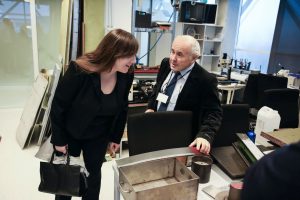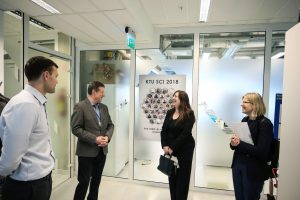According to Claire Lawrence, the Ambassador of United Kingdom in Lithuania, there should not be radical changes in cooperation in the fields of research and innovation after impending UK’s withdrawal from the European Union.
“We are willing to continue participating in Erasmus+ and Horizon 2020 programmes, and we see a lot of possibilities for the UK to contribute. I cannot see us losing interest in Europe, on contrary – research in Europe is becoming more and more interesting”, said Lawrence during her recent visit to Kaunas University of Technology (KTU) Santaka Valley.
According to the Ambassador, Great Britain is open to joint research projects and have great experience of collaboration with Lithuania in this field.
 “There is an abundance of success stories – even here, in KTU we can see people from the Britain universities, and the results of our joint projects. There is a potential to expand our collaboration in fields of health technologies, ageing society – we all face the same demographic challenges. These are the most urgent topics for our societies and we are talking about them with the Nordic-Baltic countries”, said Lawrence.
“There is an abundance of success stories – even here, in KTU we can see people from the Britain universities, and the results of our joint projects. There is a potential to expand our collaboration in fields of health technologies, ageing society – we all face the same demographic challenges. These are the most urgent topics for our societies and we are talking about them with the Nordic-Baltic countries”, said Lawrence.
Claire Lawrence, the UK Ambassador in Lithuania believes that research and innovation centres functioning in certain countries are good facilitators for developing two-partite relationship in science and innovation. From March 2018, the UK Embassy employs a specialist for science and innovation for the Baltic region.
“We are in regular contact with universities in Britain, looking for the fields, in which it would be interesting to work together”, said Lawrence.
During her visit to KTU, the Ambassador met KTU Rector Eugenijus Valatka, Mindaugas Bulota, Head of KTU National Innovation and  Entrepreneurship Centre, and visited Synthetic Chemistry and Ultrasound Research Institute in KTU Santaka Valley.
Entrepreneurship Centre, and visited Synthetic Chemistry and Ultrasound Research Institute in KTU Santaka Valley.
While talking about the importance of cooperation between business and science, the Ambassador emphasised that every country faces similar challenges: “It is important to assist researchers to turn their inventions to business opportunities. This topic we are planning to discuss with Lithuania shortly – to look for opportunities of connecting science and business in order to create innovative economies”.
KTU is actively collaborating with the UK universities in science and innovation. KTU and the University of Nottingham are the only representatives of their countries in the European Consortium of Innovative Universities (ECIU).